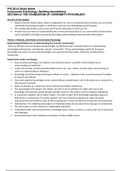Summary
Summary PYC2614 Study Notes Community Psychology: Building Foundations
- Institution
- University Of South Africa (Unisa)
PYC2614 Study Notes Community Psychology: Building Foundations The Theme I focused on was The Public Health Model, but I did include notes on the other 2 themes that can be chosen as a focus point to ensure that the notes cover all topics in the Study Guide. Got a distinction for this subject.
[Show more]



